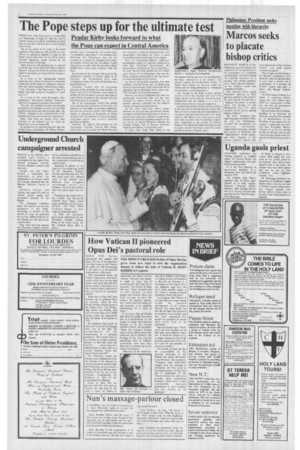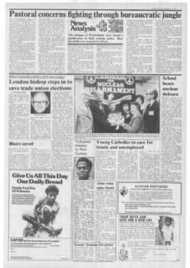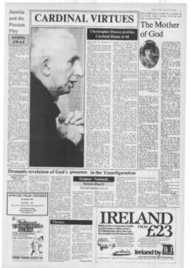Page 2, 25th February 1983
Page 2

Report an error
Noticed an error on this page?If you've noticed an error in this article please click here to report it.
Tags
Share
Related articles
Opus Dei Move Made To Allay Fears
Bishops Monitored Over Opus Dei Status
Opus Dei Savours A 'taste Of Heaven'
Opus Dei Prelate Named
Papal Praise For Beseiged Opus Dei
How Vatican II pioneered Opus Dei's pastoral role
THE NEWLY-CREATED Prelate of Opus Dei has given some new clues to how the organisation intends to follow the lead of Vatican II. JOHN HORRIGAN reports.
WHEN THE Vatican announced last August that Opus Dei was to be granted a new legal status in the Church, the press was left frustratingly in the dark as to the practical consequences of the move.
After procedural delays, the Curia's explanatory documents made it clear from the dry legal papers that Opus Dei had been given a niche in the structure of the Church which would not fit into pre-Vatican 11 conceptual models.
Sonic clues to Opus Dei's new position can be gathered from an interview which the first Prelate of Opus Dei has given to the Italian press. The Prelate, Mgr Alvaro del Portillo, took over the leadership of the 70,000 strong, mainly lay organisation after the death of its founder in 1975.
He explained that people in Opus Dei would not be changing their way of life after the establishment of the organisation as a personal prelature. They would carry on as ordinary lay people or secular priests, as they had under the rather unsatisfactory classification of Opus Dei as a secular institute, which had been in force since 1947.
The Prelature would not become more independent from the bishops of the dioceses in which its members worked. Mgr del Portillo has not been made a bishop, but Opus Dei has been switched from the care of the Vatican's Congregation for Religious to that of the Congregation for Bishops.
People in Opus Dei are pleased with their new place in Church law and hope it will make it easier for others to understand the nature of their vocation. Amongst other things, it might go some way to scotching fears that Opus Dei is secretive. The Prelate of Opus Dei says: "Some complain that we don't advertise. or issue graphs and statistics about our work. It's true, we don't. We respect the opposite opinion, but I think that such things are not necessary in an apostolic undertaking, in a work of souls."
It was put to Mgr del Portillo that Opus Dei might have been put at a disadvantage by the winds of change and openness brought in by the Second Vatican Council. He answered: "Quite the contrary! Central aspects of our spirit, such as the universal call to holiness, the theology of the laity and the sanctifying value of ordinary professional work have been taken up in a solemn way by the Council documents."
"Members of the hierarchy, who were brilliant contributors to Vatican II have not hesitated to describe our Founder as a forerunner of this Council. Even our definitive legal form has been made possible thanks to the Council creating personal prelatures. Need I say more?"
So it appears that Vatican II set Opus Dei on an easy footing within the pastoral developments of the modern Church. But some people say that the life Opus Dei expects of its members is too austere, and they can't understand how people are prepared to devote their entire lives to its apostolates.
Mgr del Portillo says: "God's grace and their freedom are all that keep them linked to Opus Dei. It would be absurd to try to oblige someone to stay in the prelature against his or her will, nor could we put pressure on anyone to continue."
The Prelate of Opus Dei has the responsibility for the spiritual formation of the faithful who attach themselves to the Prelature. He comments: "Generous souls understand straight away the meaning of self-denial, and they come in increasing numbers to Opus Dei and to institutions of the Church, old and new, that try to practise their spirituality faithfully. I think there's a close relationship between genuineness in one's vocation and the vitality of an institution."
blog comments powered by Disqus











